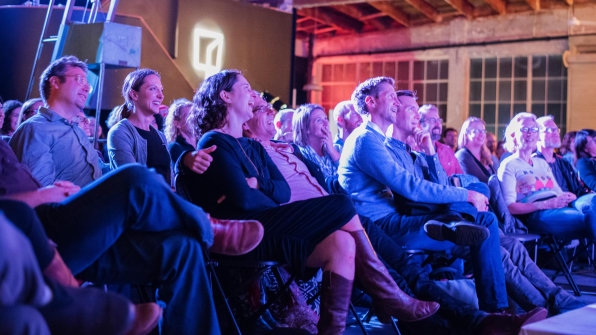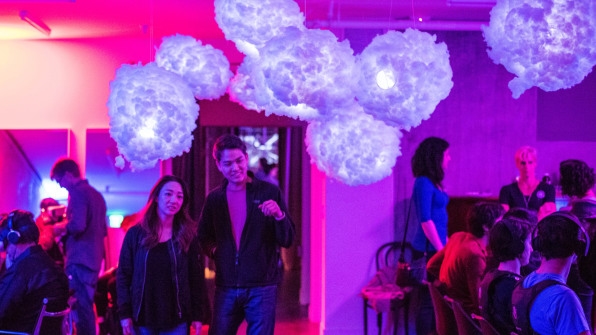When Brad Wolfe was at Stanford in the early aughts, one of his best friends, Sara LaBoskey, was diagnosed with a pediatric bone cancer called Ewing’s sarcoma. Wolfe played guitar, so he wrote a song to celebrate her, and began singing at the hospital. “People talk about the power of art. But I realized it was more than just a phrase when I saw the kind of impact that it had in connecting with Sara, and how it had some small impact on her well-being,” he says.
The artistic expression helped them both because it became a positive way to honor LaBoskey while she was still living, and to remember her after she passed. Nearly 15 years later, Wolfe is trying to take that concept mainstream, as the founder and executive director of Reimagine End of Life, a nonprofit that hosts weeklong community festivals with events, workshops, and performances meant to generate more conversation and connection around the generally taboo topic of death.

Wolfe, who eventually earned a masters in sociology, and then an MBA from Berkeley, launched the first festival in 2016. The idea took shape after OpenIDEO ran its End of Life Challenge, a public contest that took place that same year and sought new ways to re-humanize the dying process. Wolfe was inspired by the concept, and collaborated with OpenIDEO on a separate effort the explored the relationship between art and the end of life.
While death was once considered a personal, at-home, and inclusive family experience, Americans began outsourcing their family and community responsibilities to hospitals or nursing homes in the 1950s. As OpenIDEO’s original contest material notes, about 2.5 million people die each year in the U.S., with less than one-fifth in the privacy of their own home. The process of dying now has become largely institutionalized.
The festival’s second year starts April 16 in San Francisco. More than 7,000 people are expected to attend more than 175 events, with subsequent stops scheduled for Cleveland and New York later this year.
The event offers both philosophical and practical advice. Reimagine has partnered with San Francisco’s Department of Aging and Adult Services and the city’s Palliative Care Workgroup, to offer free advanced care planning sessions at 25 locations around the city. That includes helping people set up their own end-of-life health directives.

The festival is also working with San Francisco’s Interfaith Council of spiritual leaders, who have agreed to share sermons or services around these concepts, and encourage their constituents to attend events. Some of those events include Frances McDormand and David Strathairn reading Greek tragedies as the prelude to a town hall conversation, and a film festival with a talk by Lee Unkrich, the director of Pixar’s Coco, which is set in the Land of the Dead. There’s also an installment called “Exploring Racial Inequalities in Healthcare at the End of Life” with a doctor and pastor discussing how the current system fails African Americans in particular and needs reform.
Wolfe plans to sing at opening night, too. After LaBoskey passed away, he formed a band, whose album sales went toward the Sunbeam Foundation, an organization he co-founded to support rare or underfunded pediatric cancer research. The group had moderate success, and he just released a second album entitled Symphony of Loss, Love & Life.
To ensure this doesn’t become another tour stop for rich wealthy people on the conference circuit, more than half the events are free, and 10% of all tickets are given to community organizations that work directly with the elderly and those in poverty, populations where quality-of-death considerations may already be ignored. Rather than dictate programming, Reimagine works with local community groups to showcase what they feel is important. Ticket prices–which range between $5 to $20 dollars–are intended to help offset the costs of those events. (The festival is also sponsored by the Stupski Foundation, which works to improve the life chances and end-of-life care for low-income people in the Bay Area and Hawaii, among a handful of contributors.)
It’s a model that Wolfe hopes to replicate in other cities. He’s already expecting to add at least two more in 2019, with the goal of changing the national conversation, especially as ever-more boomers enter their twilight years. “The idea is that if we could allow people to engage in this topic earlier than waiting until the very end to think about it and process it, that might allow people to live their lives fully right up until the end,” he says.
After all, while society may be religiously, politically, and economically divided, death is one “universal” that everyone shares. “If we can learn to have conversations around this topic with people from all walks of life, that might inspire us to be able to connect in other ways that that can bring our community more closely together.”
(12)